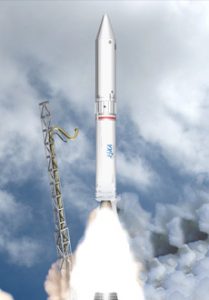
The Japan Aerospace Exploration Agency (JAXA) has announced the date of the maiden flight of its Epsilon Launch Vehicle. Epsilon-1 will lift-off, carrying the Spectroscopic Planet Observatory for Recognition of Interaction of Atmosphere (SPRINT-A), from Uchnora Space Center, on August 22 2013.
“The Epsilon launch vehicle is a three-stage solid-fuel rocket,” explained Yasushiro Morita, Epsilon Launch Vehicle Project Manager. “It uses the existing H-IIA solid rocket booster as the first stage, and an upgraded version of the upper stage of the M-V launch vehicle as the second and third stages.”
According to JAXA, Epsilon is the culmination of decades of advancement in Japanese solid-rocket studies but uses also new, cutting-edge technology to simplify the launch system. The most significant development in the Epsilon launch vehicle is the “mobile launch control” which has the capability of running autonomous checks supported by artificial intelligence. Another development adopted by JAXA was the simplification of the rocket assembly, to enable the launch of Epsilon only a week after the first stage has been placed on the pad.
Epsilon is set to deliver SPRINT-A, the world’s first space telescope for remote observation of solar system’s planets into low-Earth orbit. The scientific objective of its mission is to study the interaction of the solar wind on the atmosphere of Mars and Venus, to acquire knowledge about the early stages of the solar system. In addition, the space telescope will also perform observations of Jupiter and its satellite, Io. The 320-kilogram satellite will be delivered into an elliptical orbit of about 1000 km.
In the meantime, Japan has announced the intention to build a new launch system to replace the H-IIA rocket. The first launch of the new rocket will be around 2020 and it should mark Japan’s entry into the telecommunications satellite market. Japan had carried out its first commercial launch in 2012, placing a South Korean multipurpose satellite into orbit with an H-IIA rocket. For the present, Mitsubishi Heavy Industries (MHI), which is the launch service provider of the H-IIA rocket, and Arianespace reached an agreement pertaining to the implementation of joint proposals relating to commercial space rocket launches, on June 7. MHI and Arianespace agreed to investigate the creation of innovative new launch services and standardization of satellite preparation tasks at launch sites to sustain enhancement of the two companies’ related services.


















































































































![A trajectory analysis that used a computational fluid dynamics approach to determine the likely position and velocity histories of the foam (Credits: NASA Ref [1] p61).](https://www.spacesafetymagazine.com/wp-content/uploads/2014/05/fluid-dynamics-trajectory-analysis-50x50.jpg)



Leave a Reply